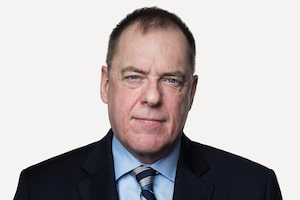Prime Minister Justin Trudeau speaks to media before Question Period on Parliament Hill on Nov. 24.BLAIR GABLE/Reuters
In the last federal election, the Liberal Party received the support of less than one-third of voters. No federal political party has formed government with a weaker public mandate.
And yet the Liberals introduced a Throne Speech this week filled with ambitious and expensive commitments. Those commitments arrive on the heels of rising inflation and warnings from the Bank of Canada that interest rates are about to go up.
It is very hard to escape the conclusion that, just like his father, Prime Minister Justin Trudeau is determined to establish a legacy – and hang the consequences.
Tuesday’s Throne Speech stressed reconciliation with Indigenous peoples, combatting climate change, new housing supports and the national child-care program.
That child-care program, once fully implemented, will add $8.3-billion annually to federal spending. A Royal Bank report released last month concluded that reducing carbon emissions by 75 per cent will cost governments, businesses and communities $60-billion annually, four times what we’re spending now.
Does the public support these expensive new measures? As recently as a month ago, the answer was yes. An October Abacus poll placed health care, vaccinations, climate change and housing affordability among the top priorities for a plurality of Canadians. The Throne Speech echoed those priorities.
“They ticked all the boxes,” Abacus CEO David Coletto told me. (The poll employed a representative panel of 2,200 adults surveyed from Oct. 15-20, with an equivalent margin of error within 1.9 percentage points, 19 times out of 20.)
But the cost of living was also an important issue for voters in the Abacus poll. And an Ipsos poll this week had “affordability and the cost of living” as the No. 1 issue. (That online poll of 1,001 adults, conducted from Nov. 12-15, had an equivalent margin of error within 3.5 percentage points, 19 times out of 20.)
The cost of living has become top of mind because of ongoing and rising inflation. Ian Lee, of the Sprott School of Business at Carleton University, says he believes “public opinion is ahead of the political leadership” when it comes to concerns about rising prices. Meanwhile, Bank of Canada deputy governor Paul Beaudry warned Tuesday in a speech that many households have taken on too much debt, just as interest rates are set to rise.
And none of this accounts for the large increases in spending that will be needed to care for the boomer generation, all of whom will soon be senior citizens.
The federal government could find itself committed to very expensive new programs at a time when the country’s debt-to-GDP ratio has seriously worsened because of the pandemic. Higher interest rates will stress federal finances, just as they will household finances. Does Mr. Trudeau believe he has a mandate to continue with his ambitious agenda, despite a deteriorating fiscal situation? Apparently he does, just like his father.
When Pierre Trudeau was unexpectedly returned to power in 1980, he made repatriating the Constitution from Britain with a bill of rights attached his overriding priority. It took many months of negotiations, court references, crises and denunciations by the Quebec government, but he succeeded.
Meanwhile, interest rates reached 20 per cent, inflation hit 14 per cent and unemployment 13 per cent. The Liberals lost the next election and were shut out of power for almost a decade.
Win or lose, the Liberals under Pierre Trudeau never received less than 38 per cent of the popular vote. Today’s Liberal Party is much weaker. It has lost the popular vote in five of the past seven elections. To govern, Mr. Trudeau requires the ongoing support of the NDP and/or the Bloc Québécois. The Conservatives are almost as unpopular as the Liberals and internally divided, all of which speaks to the declining legitimacy of political institutions in this country.
But that’s a topic for another day. What matters now is that the Liberal government appears determined to push forward with an ambitious agenda, despite having a weak electoral mandate and despite warnings from the central bank that interest rates are about to climb.
That doesn’t make fighting climate change, improving health care or seeking reconciliation with Indigenous peoples any less urgent. But it could leave the Liberals politically exposed.
For subscribers: Get exclusive political news and analysis by signing up for the Politics Briefing.
 John Ibbitson
John Ibbitson